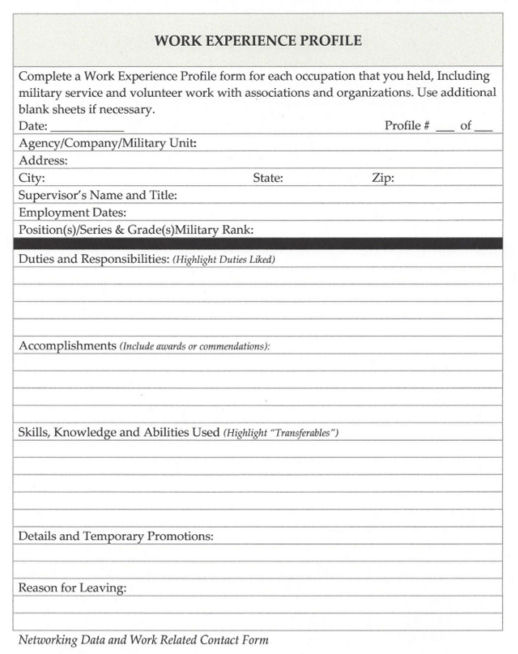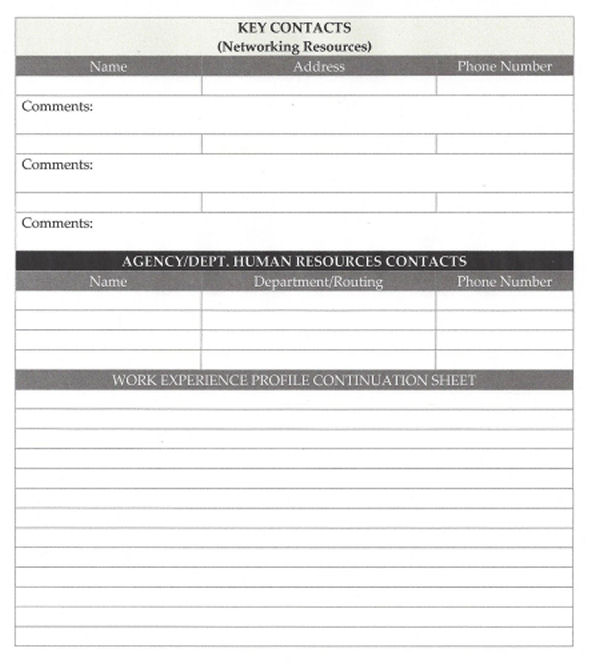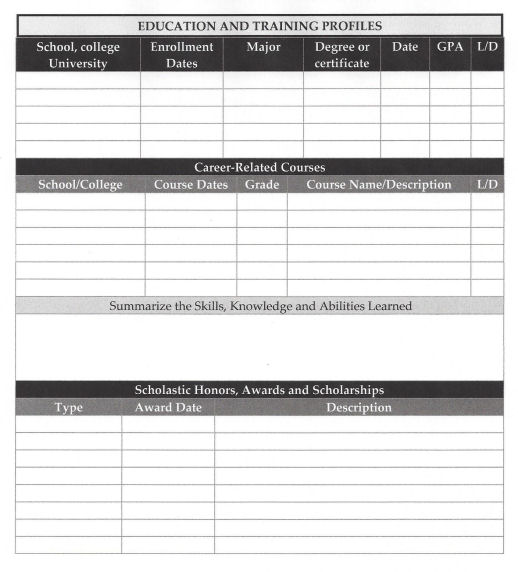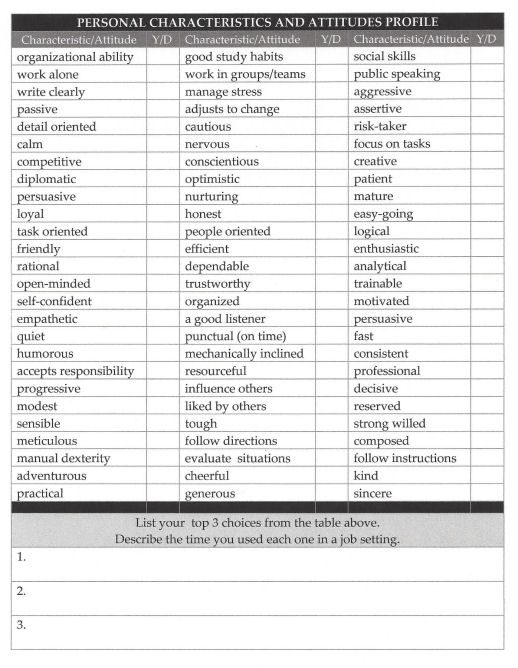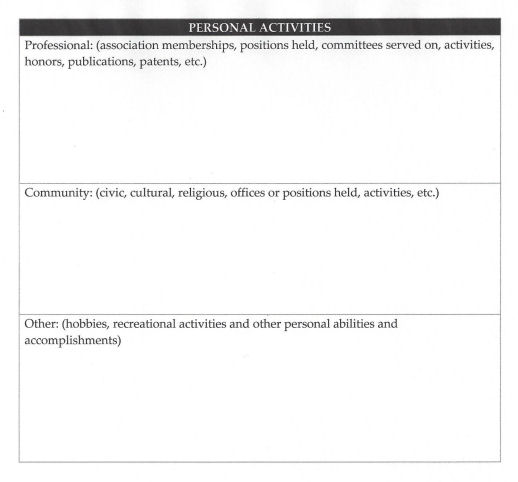Federal Employee's Career Development Center
Your Personal Profile
The self-assessment work sheets listed below are including on this site for download at no cost and will help you complete your IDP plan. These work sheets inventory your skills, knowledge, abilities, interests, accomplishments, values, networking contacts, and personal traits as they have been demonstrated in your day-to-day activities at work, school, home and in the community.
Include all your talents. Sometimes people take their biggest positives for granted. Have someone who knows you well review your worksheets to ensure you included all your positives. When completing these work sheets think about “transferables” These are skills and abilities that you can take with you to a new job. They are characteristics you have in which your new employer will be particularly interested. Several of the profiles have a column marked L/D. This means (L) Liked or (D) disliked. Check your preference. You will use this information later on to evaluate your profiles and to target new jobs.
Assessment Work Sheets Menu
- Work Experience Profile
- Key Contacts
- Education and Training Profiles
- Personal Characteristics and Attitudes Profile
- Personal Activities
- Overall Assessment (Review)
Other Work Sheets & Resources
- KSA Comparison Chart (Review)
- Personal Goals (Review)
- Career Development Charts
- IDP Form
- IDP Development Work Sheet (Review)
- Occupational Possibilities (Review)
 2021 Federal Employee’s Excel Leave Chart (FREE Excel chart tracks all leave balances)
2021 Federal Employee’s Excel Leave Chart (FREE Excel chart tracks all leave balances)
Key Contacts
Use this form to list contacts for each job, detail or lateral assignment. List names of at least 3 coworkers, supervisors or specialists that may be able to help you focus on desired jobs or vacancies. Also list the agencies Human Resource contact and phone number and key personnel that you can contact for information. The remainder of this sheet is used for notes and to capture key facts from each source.
Learn More
Education and Training Profiles
Compile your education and training history from all sources on the following forms. These forms will be used to help you determine your basic qualifications for various jobs that you will be exploring and to complete your job application. They will also help you identify other training and education that you may need for specific jobs.
Learn More
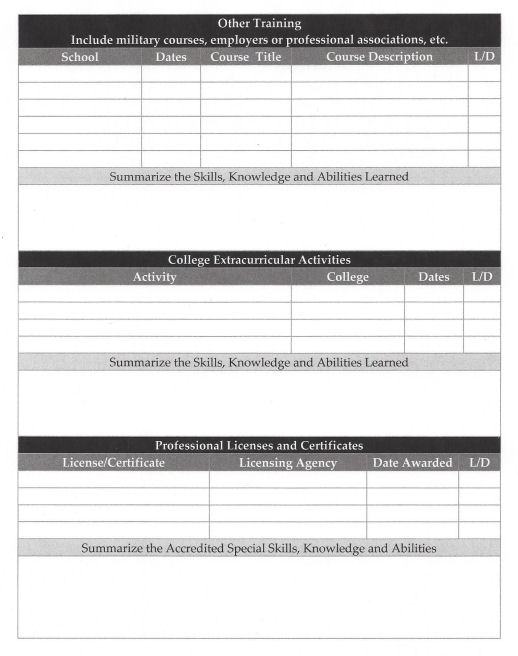
Personal Characteristics and Attitudes Profile
The following profile will allow you to take a honest look at how you perceive the world around you. Your characteristics and attitudes determine how well you will fit into certain occupations and into the world in general. If you don’t like crowds or are introverted you may find it difficult to conduct seminars or work in a group setting. This isn’t a terminal condition by any means. There are ways for you to overcome what may be perceived as a negative characteristic so that you can fit into any job situation. For example, Toastmasters International is an organization that helps people develop oral communications skills. Members work towards Competent Toastmaster status through speech presentations that are critiqued by the club’s membership. There are numerous organizations, associations, and training courses available to help you improve in all areas.
Early in my career I organized a local Toastmaster group at the Greater Pittsburgh International Airport’s Air Traffic Control Tower where I worked. I used the skills I learned for many functions that I performed throughout my career. My manager at the time also attended the meetings and one of the civilian members, through networking efforts initiated in the group, eventually was hired by the FAA and retired recently as a manager of a major FAA facility in Ohio.
Complete the following profile honestly. Answer the questions from the perspective of who you are now, not who you would like to be. Identify each item with either a Y for YES I have this characteristic or enter a D to indicate that you DESIRE to have this characteristics or attitude. Leave the area blank if the answer is no. This profile will help you investigate career choices that fit your characteristics and attitudes. It will also help you read between the lines when exploring job options. You can match the working conditions of occupations to your positive characteristics or plan a course of action to develop the characteristics that are required for your job choices.
Review Your Profile
Highlight your top six choices, include the three you selected. Select the characteristics and attitudes that you are most comfortable with and that motivate you. Explore how these characteristics and attitudes impact your life.
Ask yourself the following questions and write a few statements about these characteristics as they relate to your environment:
- How do I assimilate information? Example: I’m open minded, a good listener, and empathetic; evaluate the information and try to understand the true meaning of what is presented as it relates to the organization and agency.
- How do I come to a conclusion or decision? Example: I’m organized; like to plan and try to be sensible; accept responsibility for my actions and make every effort to gather data from all available sources before coming to a conclusion.
- How do I react to the environment around me? Example: I am a self-starter, basically friendly but somewhat nervous in groups; I prefer to work independently and like organization; enthusiastic about my job when I can be creative and focus on the task at hand; enjoy working with little direct supervision.
- What are my preferences? I like to take charge in a situation and take calculated risks; plan activities in an organized environment; Take action to resolve problems or address issues; be proactive; work inside with computers and automation equipment.
- When do I feel uncomfortable? Example: Working with someone who is indecisive; lack of control; unprofessional; working in groups; giving speeches; etc.
- What areas would I like to improve? Example: I would like to feel more at ease in group settings; my writing skills need improvement, I like to take charge but I need to be more assertive; etc.
Learn More
Personal Activities
List the activities that you have been involved with in the following groups:
- Professional: (association memberships, positions held, committees served on, activities, honors, publications, patents, etc.)
- Community: (civic, cultural, religious, offices or positions held, activities, etc.)
- Other: (hobbies, recreational activities and other personal abilities and accomplishments)
This information will be used to help you identify areas of interest plus it can be used in your federal resume and application when you apply for targeted positions.
Learn More
Overall Assessment (Review)
Review all of the work sheets you have completed and consider all you have done and where you are now in your agency, list your strengths and positive attributes on a separate sheet of paper for each of the areas below:
- Skills, Knowledge, and Abilities
- Accomplishments
- Personal Characteristics
- Activities Performed Well
- Activities That I liked
Review Your Assessment Sheets
Do the strengths and positive attributes listed suggest possible careers for you? Your choice of a career does not have to be limited to the ones in which you have the most direct education, experience or training. Ask yourself:
- Do I want to remain in that field?
- Am I in a dead end position?
- What is my career ladder potential? (The top grade for my occupation.)
- Are there upward mobility programs that I can take advantage of?
- Would the strengths I have listed serve in a related occupational group?
- What jobs within my occupational group should I explore?
- What additional strengths do I need to develop?
- Would I consider returning to school to learn new job skills which are in demand?
- Does my agency offer after hours tuition reimbursement?
- Are agency Internet courses available that will help me achieve my goals?
- Are agency College Training Initiatives or cooperative programs available?
- Can my job experiences and education translate to other occupational groups?
- Which occupations would my interests, experience and education fit?
- What other agencies should I explore?
- How do I determine which agency has the jobs I choose to explore?
- Am I willing to relocate?
When answering these questions, carefully consider personal circumstances, your lifestyle, health, family circumstances and financial needs. Keep these factors in mind when making career plans.
An associate of mine wanted to change careers and applied for an inspector position in New Your City. He was living in a much lower cost of living area. He applied for the job and was accepted but after researching the cost of housing and living expense, he had to turn it down. He was married with two children and didn’t feel that he could maintain a comparable standard of living in New York.
Considering everything you know about yourself, try to think of several career possibilities that you could do well and would enjoy. Review the Federal Occupations Lists and ask your training department if they have Course Recommendation Charts for occupations of interest. This exercise will help you begin to focus on occupations that currently interest you.
List careers you identified on a sheet of paper and keep it with your assessment forms.
The Next Step: Exploring Opportunities
